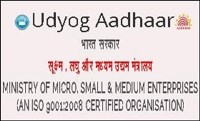
The Ministry of Micro, Small and Medium Enterprise (MSME) has come up with a new idea to make the registration process easier for the small business sector. According to media reports, it has sought - on social media network sites - suggestions from stakeholders on Udyog Aadhaar card, a new initiative to enable small business units get registered on the basis of self certification of their existence, bank account, business activity details, employment and ownership information and other basic information.
Registration has remained a major problem for the small business sector. India has around 36 million MSME units, but out of them only 1.56 million units are registered. Percentage-wise, around 96 percent of them are still unregistered. This means policy support is available only to a small portion of the sector. In the background of this, I think the Udyog Aadhaar initiative would give a big push in getting the unregistered MSME units officially registered.
The Udyog Aadhaar Form, based on recommendations of the Kamath Committee on Financial Structure of MSME Sector, is expected to promote single window clearance by cutting down the lengthy registration process. Under the system, even multiple enterprises under a single owner would be able to register themselves through the form by using Aadhaar Identity as enterprise 1, 2 and more. In other words, the system will pave the way for registration for thousands of small businesses, which have not registered themselves yet due to cumbersome procedures.
Meanwhile, amid a lot of talk about improvement in ease of doing business, a two member mission from the World Bank recently landed in India to collect data for the Doing Business Report 2016. It has been reported that some government officials briefed the mission about several reform measures of which the latter promised to take note of. The Make in India programme has generated huge interest among investors and I think the steps taken under it would help us earn a higher rank in the list, which is likely to be released in October.
But, it is equally true that we still have a lot to do in the direction. The country has traditionally inherited a business ecosystem crippled by a highly inefficient political and bureaucratic system. Our elected representatives can still make a mess of any progressive legislative proposals; our policy makers can still make panic-creating comments; our bureaucracy, particularly in the states, is still subject to inefficiency and corruption. We still have an infrastructure with poor road, rail, port and aviation connectivity. These challenges must be addressed if we want to make the country a really better place to do business.